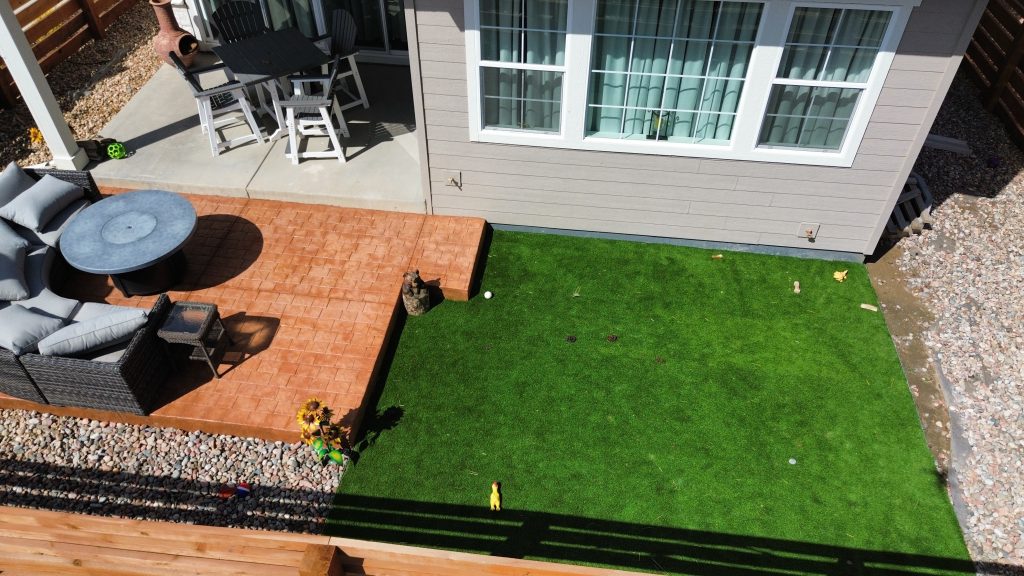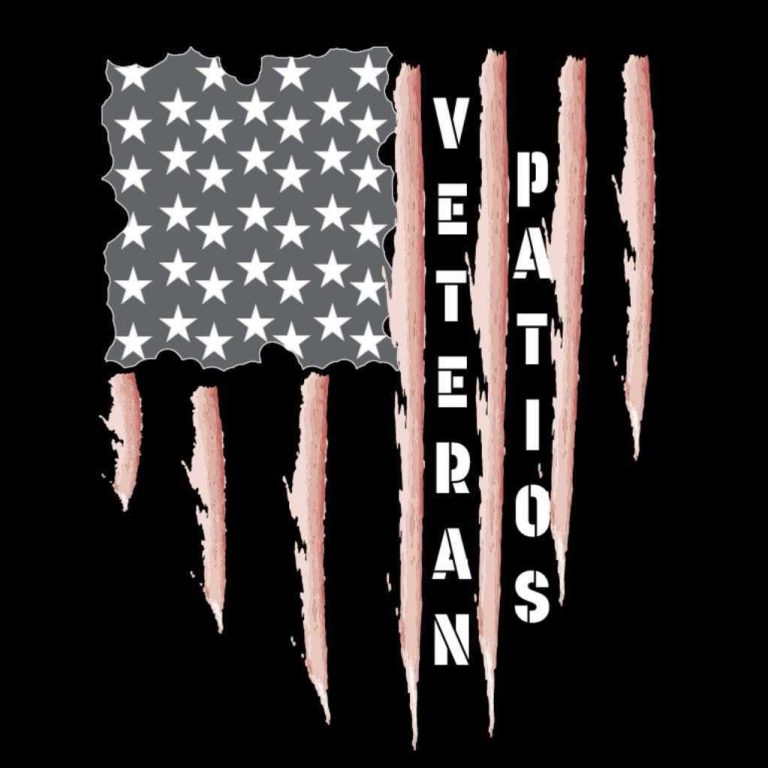
Artificial grass has become a popular choice for Denver homeowners who want a low-maintenance, year-round green lawn. Over the past 15 years, at Veteran Patios, we have had the privilege of transforming countless landscapes with synthetic turf throughout the Denver Metro Area. One question we get asked most often is, “How long does artificial grass last?”
Today’s artificial grass is built to last. With proper installation and maintenance, premium lawns can remain beautiful and functional for 15 to 20 years or more. This remarkable longevity is worlds apart from earlier generations of artificial turf, many of which had a maximum lifespan of about eight to ten years.
Several factors contribute to how long artificial grass will keep its exceptional appearance. These include the quality of installation, the type of material used, the conditions it is exposed to, and how the lawn is used. By understanding these details, homeowners can make informed decisions about their artificial turf investment.
The Importance of Quality Installation
The durability and longevity of artificial grass start with high-quality installation. When done correctly, the preparation and installation provide a foundation that ensures long-term performance. At Veteran Patios, we pride ourselves on a meticulous approach to artificial grass installation. This includes clearing the area of any vegetation and debris, creating a stable and graded crushed stone base, placing a weed barrier fabric, and using professional-grade techniques to secure the turf. Proper infill helps support the fibers, while drainage designs ensure water flows freely through the base.
Cutting corners during installation, by contrast, may lead to wrinkles, ripples, and drainage issues. This can significantly reduce the lifespan of the turf, regardless of the quality of the materials used.
Material Matters
Not all artificial grass is created equally. The materials used have a tremendous impact on longevity. Premium turf products are made of durable fibers such as polyethylene, polypropylene, or nylon. Each of these materials offers varying levels of strength, with nylon being the most robust. Fiber thickness and turf density also play a role. Thicker fibers and higher densities are better able to withstand wear and tear over time.
UV protection is another crucial factor, especially in Colorado’s sunny environment. Superior stabilizers in premium turf products are designed to resist fading and degradation from prolonged sun exposure. The backing material must also be tough enough to resist tearing while maintaining drainage capability. While high-quality materials come at a higher initial cost, they offer significantly better longevity and value in the long run.
Usage Patterns and Wear
The way artificial grass is used plays a substantial role in its lifespan. High-traffic areas, such as pathways and children’s play areas, may show signs of wear sooner than those serving a primarily decorative purpose. Similarly, a yard with frequent pet activity will require regular maintenance to preserve the integrity of the turf. Areas where heavy items like furniture are placed can also develop compression over time if not managed appropriately. For these situations, selecting turf designed to endure heavy activity is crucial. During our consultations, we work with clients to establish the best turf options for their usage needs.
Weathering Denver’s Climate
Denver’s climate offers unique challenges for synthetic turf. Unlike more humid regions, Denver’s low-moisture conditions reduce the risk of mold and mildew forming on turf. However, the intense UV exposure at Denver’s elevation can accelerate fading in lower-quality products. Additionally, fluctuations in temperature can test the durability of the turf’s backing material, as it expands and contracts. Another factor to consider is the debris from changing seasons, as leaves and organic material can accumulate and require regular clearing to maintain the lawn’s appearance and usability.
At Veteran Patios, we take these conditions into account when recommending and installing artificial grass to ensure its performance holds up against Denver’s climatic extremes.
Recognizing Signs of Aging
Even the best artificial grass will not last forever. Over time, there are visible signs that your turf may be aging and nearing the end of its lifespan. If the fibers become matted or flattened to a degree where brushing no longer restores them, or if you notice exposed backing due to fiber separation, these are indicators that replacement may be necessary. Split seams between sections of turf or persistent drainage problems are further signals that the turf’s lifespan is reaching its conclusion. Additionally, fading that gives the grass a dull or washed-out look can impact its aesthetic appeal. While isolated issues can often be repaired, widespread degradation typically warrants a replacement.
Low Maintenance for the Long Haul
One of the main appeals of artificial grass is its low maintenance compared to natural lawns. However, “low maintenance” does not mean zero maintenance. Regular care is essential to preserving the condition of your turf. Weekly tasks may include removing debris such as leaves and rinsing pet areas to prevent odors. Spot cleaning any stains promptly will also help prevent long-term damage.
Monthly or quarterly maintenance should include brushing the turf to keep fibers standing upright, checking for weeds along edges, inspecting seams for separation, and replenishing infill in high-traffic areas. Annually, a deep clean can ensure the turf remains fresh, and drainage performance can be evaluated during rainy periods. To protect your investment, it’s important to avoid practices that can damage the turf, such as using harsh chemicals, placing hot items on the surface, or neglecting drainage issues.
At Veteran Patios, we offer seasonal maintenance programs designed to keep our clients’ artificial grass looking its best for years to come.
A Cost-Effective Landscape Solution
When evaluating artificial grass, it’s important to consider the long-term value. While the initial installation costs for quality turf can range between $10 to $15 per square foot, its lifespan of 15 to 20 years makes it an economical choice over time. Homeowners save on water bills, fertilizers, pesticides, equipment purchases, and the labor hours required for natural lawn upkeep. These combined savings, along with the aesthetic benefits, make artificial grass a practical investment.
Environmental Impact
Artificial grass also helps support environmental sustainability. Each square foot of turf installed in place of natural grass reduces water use, which is especially crucial in Colorado’s semi-arid climate. This can result in saving up to 18,000 gallons of water annually for a typical Denver lawn. The absence of fertilizers, herbicides, and mowing means reduced chemical use and lower carbon emissions. Additionally, the absence of grass clippings helps reduce yard waste.
Enhancing Outdoor Living with Artificial Grass
Artificial grass is an excellent choice for Denver homeowners looking to create a sustainable and beautiful landscape that lasts for decades. With quality materials, professional installation, and consistent maintenance, artificial lawns offer unmatched durability and cost-effectiveness.
At Veteran Patios, we take pride in helping homeowners select the best artificial grass solutions tailored to their needs. Whether it’s for a backyard play area, pet zone, or decorative space, our team ensures every installation is designed for longevity and optimized for Denver’s unique climate.
If you’re considering artificial grass for your property, contact Veteran Patios today to schedule a consultation with our experts. We’re here to bring your vision of a perfect, low-maintenance landscape to life.


